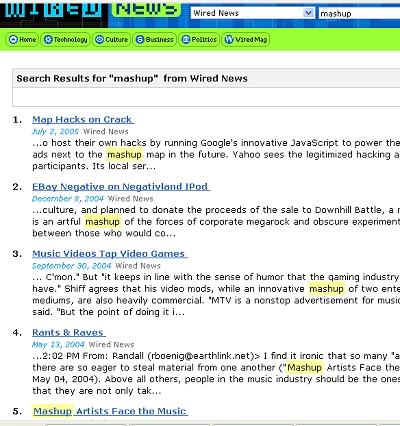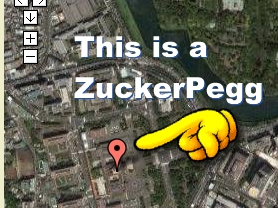On Google Maps Mashups and Google Maps Mash-Ups
I was just reading this interesting link from a blog, commenting on how USA Today was putting in hyphens in the newly-coined term, “Google Maps mash-ups.” What’s a mashup/mash-up? I dunno. Something to do with hackers who reverse-engineer the Google Maps technology and use it for other nefarious purposes, such as showing what kind of damage a nuclear bomb would do on different world locations. It’s not a verb, but it appears to be one of those words created when someone takes a transitive verb or an action phrase and converts it into a noun — sorta the opposite of the more widespread turning nouns into verbs. Like, well, “google”.
Much of this big hoopla is fabricated — no one really cares about how the word is spelled, but since Google Maps is getting a whole lot of press, the word mashup/mash-up is also getting some exposure. And reporters aren’t sure how to spell it. As mentioned, USA Today uses the hyphen, but Wired Magazine didn’t, as can be seen from the following picture snarfed from their search engine:

Nor does the guy from GoogleMapsMania use the hyphen, and he’s considered the foremost authority on the topic (for some strange reason).
So, should the hyphen stay or go? Should it remain a compound noun-ized transitive verb, or should we take the plunge and make it a whole new word?
There are many precedents for losing the hyphen, as is seen in the language of modern computer words, such as: inkjet, laptop, hyperlink, flamewar, firewire, email, etc. However, there are still people out there (like my mom) who use Wi-Fi, scroll-bar, and MS-DOS.
The folks at AskOxford gave some general style guide points which were apparently better than what the editors of the 1911 Concise Oxford Dictionary wrote in their preface:
“We have also to admit that after trying hard at an early stage to arrive at some principle that should teach us when to separate, when to hyphen, and when to unite the parts of compound words, we had to abandon the attempt as hopeless, and welter in the prevailing chaos.”
AskOxford’s best advice was that the hyphen be used “to clarify compounds with similar adjacent sounds, such as sword-dance, co-opt, tool-like,” or “to avoid misunderstanding by distinguishing phrases such as twenty-odd people and twenty odd people”. Heh, “twenty odd people.”
My old English prof once stated that people who use hyphens excessively are simply afraid of making new words. Since the English language is a living language, it’s going to be in a constant state of evolution. Whatever survives in the language will push the language forward.
This University of Sussex website has a good bit of instruction:
“Use your judgement: put a hyphen in if you can see a problem without it, but otherwise leave it out.” It goes on to cite examples that would include commonly-used words and terms that have become part of everyday English (as opposed to every-day English, or every day English): miniskirt, nonviolent, prejudge, antisocial aren’t hyphenated, but mini-aircraft, non-negotiable, pre-empt, anti-aircraft are.
Another point of consideration: we’ve been getting a little lazy with the advent of dotcom (dot-com) jargon and that horrible bastardized SMS-speak (i hezit8 2 c@11 it a language). Many websites are compressing whole sentences into one word for the sake of fitting it on a domain name (i.e. RedHotAsianTeenPussyCatsWhoChaseLittleBallsOfString.com). So, really, anything goes these days.
I think that we should be thrilled with the opportunity to help contribute to the English language. I think that since we’ve got a new term forming here, we should call it mashups, and make it a whole word, just like so many other computer terms. It looks a little weird, and may take a little getting used to. Maybe we need to add caps it and call it MashUps for a while, but the effect is indistinguishable from using a hyphen, if you ask me. Better to just let loose and make it a word.
Will it ever get adopted as part of our language? It all depends on how long the term exists, how often it’s used, and whether people will feel comfortable with using it in everyday talk. Will people get used to looking at the word “mashup”? It all depends on the time-frame, and the usage-patterns of the Inter-Web users.
Speaking of new terminology, here’s my chance to make it into the books. Know those cute little pins they use on Google Maps? We should call them “zuckerpeggs”. The second “g” can stand for “Google”. It could work.


 Previous Post
Previous Post